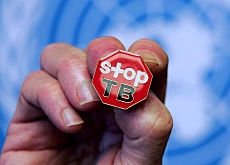Swiss reject tuberculosis threat

The Swiss Lung Association has dismissed warnings that western Europe is at risk of a tuberculosis epidemic from drug-resistant strains at its borders.
The organisation said on Tuesday that the chances of an outbreak in Switzerland were “negligible” – a view challenged by the Geneva-based World Health Organization (WHO).
On Monday the WHO and other leading health agencies called on countries to do more to fight the alarming increase in cases of multi-drug resistant TB in the Baltic States, eastern Europe and Central Asia.
They noted that 450,000 people fell ill with tuberculosis and 70,000 people died from the disease in these regions every year.
“If we are to defend public health in the European Union then we must address this emergency on our doorstep,” warned Zsuzsanna Jakab, director of the European Centre for Disease Prevention and Control.
But Jean-Pierre Zellweger, medical adviser to the Swiss Lung Association’s tuberculosis centre, said there was no cause for alarm in Switzerland, which although a non-member is situated at the heart of the EU.
“The problem exists in eastern Europe but its influence on the situation in western Europe, and particularly in Switzerland, is absolutely negligible,” he told swissinfo.
“We know that in Germany, France, Italy and in Switzerland the majority of TB cases are observed among foreigners. But the absolute numbers are extremely small.”
Cases falling
Zellweger said TB cases had been declining steadily in Switzerland for the past five decades and around 500 cases were expected to be diagnosed this year, with only 20 per cent of them classed as infectious.
He said so far this year only eight cases had been detected at the border. Switzerland is one of the few European countries to systematically screen all asylum seekers for TB.
Zellweger said arguments that EU expansion to the east would increase the risk of drug-resistant strains spreading were somewhat spurious. He said people ill with the disease were unlikely to travel.
“There is virtually no risk at all for the local population,” he said.
The Swiss Lung Association’s risk assessment of drug-resistant strains was echoed by the Federal Health Office, which funds the organisation’s tuberculosis centre
Ekkehardt Altpeter, a specialist in public health, stressed that tuberculosis was taken extremely seriously by the government but said drug-resistant strains were not a major concern.
“With regard to multi-drug resistant tuberculosis we don’t really have a huge problem in Switzerland,” he said.
Drug resistance
Altpeter said the Federal Health Office had been registering cases of drug-resistant TB for the past decade and numbers had remained stable – five cases were identified in 2005. He added that he did not see the situation in Switzerland being affected by increased migration flows.
Responding to the Swiss Lung Association’s declaration that the risk was negligible, the WHO strongly denied that it was exaggerating the threat.
“This is an understatement which requires immediate rectification. People have to understand that there is a risk,” Mario Raviglione, director of the WHO Stop TB department, told swissinfo.
He recalled that the EU bordered countries with the highest levels ever recorded of multi-drug resistant tuberculosis, adding that there was clear evidence linking episodes of these strains in western Europe to population movements.
“We are telling people that they have to be prepared. It was the same story with avian flu and Sars, but sooner or later something will come,” he said.
swissinfo, Adam Beaumont in Geneva
Tuberculosis is primarily an illness of the respiratory system, and is spread by coughing and sneezing.
Each year about 1.7 million people die from tuberculosis worldwide.
TB can be treated successfully with antibiotic drugs.
The highest number of deaths occur in Africa.
The Swiss Lung Association’s tuberculosis centre, which is funded by the government, is based in Bern.
According to the Federal Health Office, 593 tuberculosis cases were recorded in Switzerland in 2004. Around two-thirds of those infected with the disease were foreigners.
Drug-resistant TB is caused by inconsistent or partial treatment, when patients do not take all their medicines regularly for the required period.

In compliance with the JTI standards
More: SWI swissinfo.ch certified by the Journalism Trust Initiative

You can find an overview of ongoing debates with our journalists here. Please join us!
If you want to start a conversation about a topic raised in this article or want to report factual errors, email us at english@swissinfo.ch.